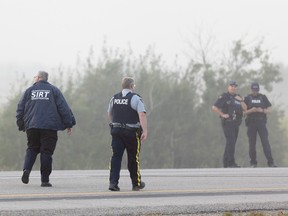The province is promising to provide further information in early January.

Saskatchewan’s SIRT is meant to end the practice of having police officers investigating serious incidents involving other police officers. Starting Jan. 1, SIRT will be the investigative arm to the policing oversight provided by the existing Public Complaints Commission (PCC).
Its mandate is to investigate all incidents involving sexual assault, serious injury or deaths in police custody or as a result of an officer’s actions. It could also investigate if a law enforcement agency believes an officer’s actions led to serious injury or death or an officer committed a sexual assault or interpersonal/domestic violence while off duty. The executive director can call an investigation into other incidents if they believe it would be in the public’s interest.
The regulations also define the kinds of serious injury that would lead to a SIRT investigation. These include gunshot injuries, loss of a body part, hearing or vision, fractures of certain bones and wounds resulting in in-patient hospitalization.
Erick Laming, an assistant professor in criminology at Trent University who researches issues of police accountability, said in an email that the legislation and recent regulations look fairly consistent with other similar teams in Canada.
However, he finds it odd that the Saskatchewan SIRT’s executive director can’t charge an officer who is believed to have committed a criminal act, and has to refer the matter to the provincial or federal attorney general to make that decision. In five other provinces, the policing oversight body’s head can lay charges independently, Laming wrote.
He said it’s also still unclear precisely which types of incident could lead to a SIRT investigation, such as police shootings that don’t result in serious injury or death.
Laming also questions why Saskatchewan will release summary reports rather than complete reports.
“That’s the point of transparency. We already have other SIRTs disclosing full reports (i.e., SIU in Ontario), so why is Saskatchewan only choosing to be half transparent when it comes to this?” he asked.
Christopher J. Schneider, a sociology professor at Brandon University, said it’s about time Saskatchewan implemented a SIRT.
He said the language of the regulations is fairly standard, but drew attention to the fact that officers under SIRT investigation are to voluntarily provide their notes or statements to investigators. This policy is consistent with other provinces, but since police act as agents of the state with authorization to use force, they should be treated as such.
“I think, if we’re talking about accountability, we’re talking about oversight, I think this language is problematic and the officers should be required to provide any and all materials relevant to an investigation,” he said.
Laming said he realizes that legally it’s a difficult position, since an officer who becomes the focus of an investigation could possibly face criminal charges, and has the same right of protection from self-incrimination as anyone else.
Both experts said they’re interested in hearing more about the investigators themselves, including whether they have prior police experience.
In an email, the Ministry of Corrections, Policing and Public Safety said the SIRT has hired four investigators and is based in Saskatoon. It said information about the amendments coming into force will be formally announced in January.
The 2022-23 provincial budget includes $647,000 for the SIRT.

Post a Comment